A Quote by William Godwin
I know nothing worth the living for but usefulness and the service of my fellow-creatures. The only object I pursue is to increase, as far as lies in my power, the quantity of their knowledge and goodness and happiness.
Related Quotes
For the Humanist, . . . head and heart . . . must function together. . . . The constitution of the Phillips Exeter Academy reads: 'Though goodness without knowledge . . . is weak and feeble, yet knowledge without goodness is dangerous. . . . Both united form the noblest character and lay the surest foundation of usefulness to mankind.'
Happiness has nothing to do with what you have or don't have. Happiness is related to what you are. However many things you may collect, perhaps they may increase your worries, your troubles, but happiness will not increase because of them. Certainly unhappiness will increase with them, but they have no relation to an increase in your happiness.
Did it ever strike you that goodness is not merely a beautiful thing, but by far the most beautiful thing in the whole world? So that nothing is to be compared for value with goodness; that riches, honor, power, pleasure, learning, the whole world and all in it, are not worth having in comparison with being good; and the utterly best thing for a person is to be good, even though they were never to be rewarded for it.
God has no needs. Human love, as Plato teaches us, is the child of Poverty – of want or lack; it is caused by a real or supposed goal in its beloved which the lover needs and desires. But God's love, far from being caused by goodness in the object, causes all the goodness which the object has, loving it first into existence, and then into real, though derivative, lovability. God is Goodness. He can give good, but cannot need or get it. In that sense , His love is, as it were, bottomlessly selfless by very definition; it has everything to give, and nothing to receive.







































